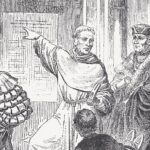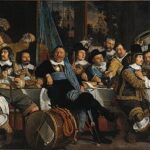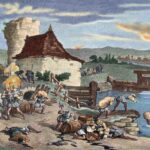October 12, 1518
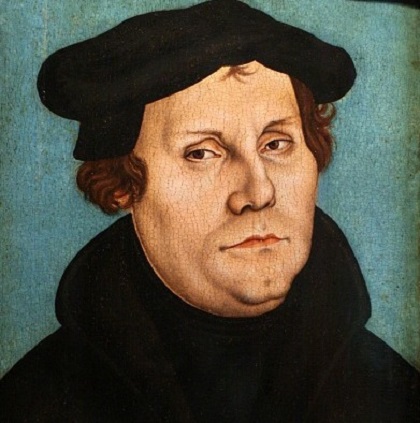 Having been called to the offices of Cardinal Thomas Cajetan, Martin Luther refuses to retreat from the positions taken in his 95 thesis on indulgences. The theses had been posted a year earlier on the door of the Hofkirche in Wittenberg. (The church still stands although the wooden doors are gone. They have been replaced with bronze doors with the 95 theses embossed onto them.)
Having been called to the offices of Cardinal Thomas Cajetan, Martin Luther refuses to retreat from the positions taken in his 95 thesis on indulgences. The theses had been posted a year earlier on the door of the Hofkirche in Wittenberg. (The church still stands although the wooden doors are gone. They have been replaced with bronze doors with the 95 theses embossed onto them.)
October 12, 1576
Death of Maximilian II in Regensburg, Germany. Maximilian became Holy Roman Emperor in 1546. He tried to instill tolerance between Catholics and the new Protestants.
October 12, 1618
Death of Jakob Rem (1546-1618). Jakob Rem, who is currently being considered for beatification, was born in Bregenz, Austria, in 1546. He became a member of the Jesuit Order in 1566. He was dedicated to Christian education and was active during his lifetime in Ingolstadt, Germany; Dillingen, Germany; Munich, Germany. He founded the student group of the Congregation of Mary.
October 12, 1810
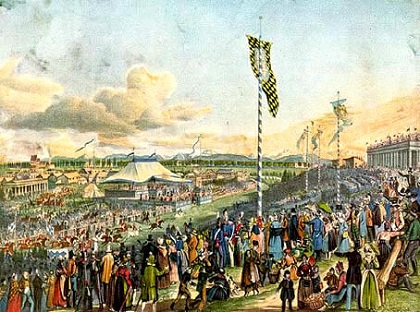 The first Oktoberfest takes place on the 12th of October, 1810. On this day the Crown Prince Ludwig of Bavaria married Princess Therese of Saxony-Hildburghausen. To celebrate the event in the Bavarian capital city, Munich, a massive party was arranged on the fields in front of the city gate. The event has been celebrated ever since and has become a worldwide attraction for the city of Munich. Over 6 million visitors come every year to the festival which now begins in late September and concludes in the first week of October.
The first Oktoberfest takes place on the 12th of October, 1810. On this day the Crown Prince Ludwig of Bavaria married Princess Therese of Saxony-Hildburghausen. To celebrate the event in the Bavarian capital city, Munich, a massive party was arranged on the fields in front of the city gate. The event has been celebrated ever since and has become a worldwide attraction for the city of Munich. Over 6 million visitors come every year to the festival which now begins in late September and concludes in the first week of October.
October 12, 1862
Birth of Theodor Heinrich Boveri in Bamberg, Germany. Boveri, a cytologist, proved that chromosomes are separate, continuous units in the nucleus of the cell. Boveri was a professor at the University of Würzburg.
October 12, 1891
Birth of Edith Stein in Breslau, Germany (now Poland). Stein converted from Judaism to Catholicism (1904) and became a Carmelite nun. She earned her doctorate at the University of Göttingen in philosophy. She subsequently taught at Göttingen. She became a teacher at the Institute for Pedagogy in Münster in 1932, but had to resign shortly thereafter due to growing anti-semitism in Germany. She entered the Carmelite convent in Cologne in 1934 taking the name, Teresa Benedicta of the Cross. In 1938 due to increasing Nazi pressure she moved to the convent in Echt, Holland. There she was arrested by the Gestapo and sent to the concentration camp at Auschwitz where she was murdered in a gas chamber. She was beatified in 1987. Works by Stein include Endliches und ewiges Sein, andStudie über Jonnes a Cruce: Kreuzeswissenschaft.
October 12, 1907
Birth of Wolfgang Fortner in Leipzig, Germany. Fortner was a composer who taught in Heidlberg, Detmold, and Freiburg. In addition to instrumental and vocal music, Fortner composed operas, including Die Bluthochzeit, and In seinem Garten liebt Don Perlimplin Belisa.
October 12, 1965
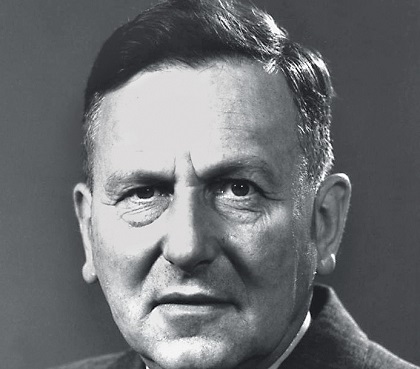 Death of Paul Hermann Müller in Basel, Switzerland. In 1948 he won the Nobel Prize for Physiology or Medicine for his discovery of the chemical DDT (dichlorodiphenyltrichloroethane), as an insecticide of significant power. The chemical did much to increase world food production and control disease. Unfortunately it turned out that it stays in the environment for long periods of times and ultimately has negative effects on animal life. Today the chemical is widely banned.
Death of Paul Hermann Müller in Basel, Switzerland. In 1948 he won the Nobel Prize for Physiology or Medicine for his discovery of the chemical DDT (dichlorodiphenyltrichloroethane), as an insecticide of significant power. The chemical did much to increase world food production and control disease. Unfortunately it turned out that it stays in the environment for long periods of times and ultimately has negative effects on animal life. Today the chemical is widely banned.
